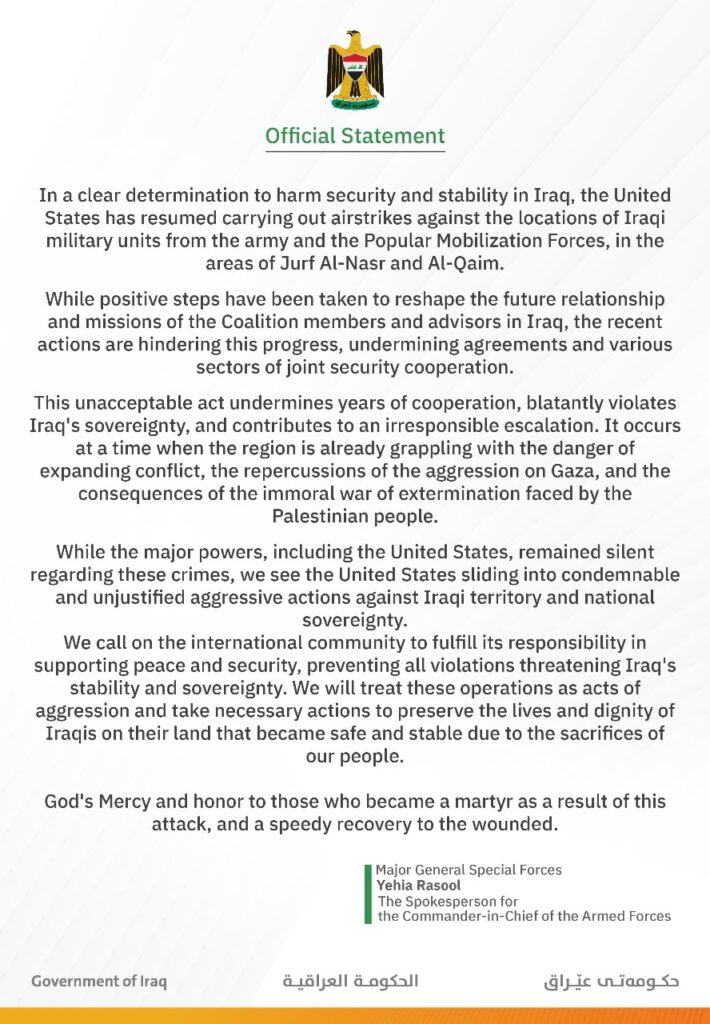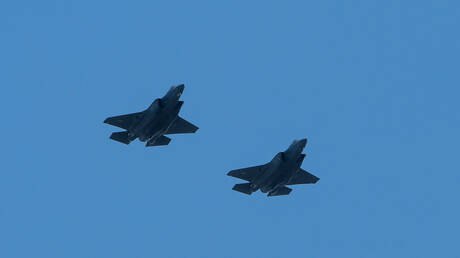The simmering tensions between the United States and Iran in the Middle East reignited on Wednesday, January 24th, 2024, with US airstrikes targeting facilities used by Iranian-backed groups in Iraq. This latest escalation has drawn sharp condemnation from the Iraqi government and threatens to further destabilize the already volatile region.
The Spark of Conflict: Iran-affiliated groups
The US military launched “proportionate” strikes against three facilities belonging to the Kataib Hezbollah militia and other Iran-affiliated groups. According to US Defense Secretary Lloyd Austin, these strikes were a direct response to a series of “escalatory attacks” against US and international forces in Iraq and Syria.

The Popular Mobilisation Forces (PMF), an umbrella group dominated by Iran-backed Shia militias, confirmed the strikes and reported one fighter killed and several others injured. The PMF condemned the US action as “treacherous” and accused it of contributing to a “reckless escalation.”
Iraq’s Outrage and International Concerns:
The Iraqi government vehemently condemned the US airstrikes, calling them a “blatant” violation of the country’s sovereignty. Prime Minister Mohammed Shia al-Sudani’s spokesperson, Major General Yehia Rasool, stated that the strikes undermined years of cooperation and added fuel to the fire of regional conflict.

He further warned that Iraq would consider the US operations as “acts of aggression” and urged the international community to intervene and restore peace. This sentiment was echoed by Iraq’s national security adviser, Qassem al-Aaraji, who argued that the US should prioritize de-escalation and focus on ending the Israeli offensive in Gaza instead of targeting Iraqi soil.
A Tangled Web of Attacks and Retaliations:
The US airstrikes came on the heels of a ballistic missile and rocket attack on Iraq’s Al Asad air base, which injured four US military personnel. The Pentagon attributed the attack to an Iran-backed militia, specifically the Islamic Resistance in Iraq, which has claimed responsibility for several recent attacks against US forces.
The US military maintains that these attacks are orchestrated by Iran and its proxies, aiming to destabilize the region and challenge US influence. In response, the US has carried out airstrikes against Iranian-backed groups in Iraq and Syria, further escalating the tit-for-tat cycle of violence.
Beyond the Immediate Conflict:
The recent events in Iraq are intricately linked to the broader geopolitical landscape of the Middle East. The ongoing conflict in Gaza, the complex relationship between Iran and Israel, and the regional power struggle all contribute to the simmering tensions and create an environment ripe for escalation.
The US airstrikes in Iraq risk exacerbating these existing tensions and potentially drawing other regional actors into the conflict. The international community has expressed concern about the escalating violence and called for all parties involved to exercise restraint and pursue diplomatic solutions.
The Road Ahead: Uncertain and Fraught with Challenges:
The future trajectory of the situation in Iraq remains uncertain. The US and Iran appear entrenched in their positions, with each side accusing the other of instigating the conflict. The Iraqi government finds itself caught in the middle, struggling to maintain its sovereignty and navigate the complex web of regional rivalries.
Also Read: A Devastating Double Blow: 7.1 Earthquake Rocks Kyrgyzstan-Xinjiang Border, Followed by Another 7.2 in Southern Xinjiang
The potential consequences of further escalation are dire. Increased violence could destabilize Iraq, displace civilians, and create a breeding ground for extremism. It could also lead to a wider regional conflict, drawing in other countries and further jeopardizing peace and security in the Middle East.
In this precarious situation, diplomacy and dialogue are crucial. All parties involved must prioritize de-escalation, engage in constructive dialogue, and work towards finding a peaceful resolution to the conflict. The international community has a vital role to play in facilitating dialogue, mediating disputes, and promoting regional stability.
